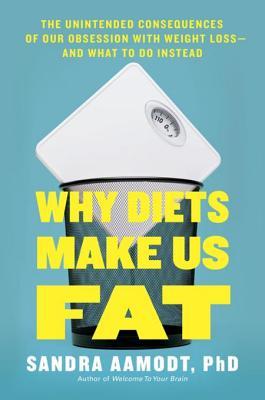As one of the few remaining people in America who've never seen a TED talk, I came upon Sandra Aamodt's fascinating research findings via a good old-fashioned book.
 It seems that 108 million Americans went on a diet in 2015. "Yet research shows that dieters almost always regain their lost weight within a few years, no matter which diet plan they follow. In fact, they often regain more weight than they've lost" (p2). This isn't news, right? Everyone who has dieted or who knows someone who has dieted has also probably known a yo-yoer. The questions seems to be how long of a string their yo-yo has: will the weight come back in six months? A year? Two years? Hard to say because, as Aamodt points out, most diet studies end after six months, when a reasonable success rate can still be claimed, and then by two years, the yo-yo has returned to its starting point (if not overshooting it), and the person has gone on to the next diet. Oh, the humanity.
It seems that 108 million Americans went on a diet in 2015. "Yet research shows that dieters almost always regain their lost weight within a few years, no matter which diet plan they follow. In fact, they often regain more weight than they've lost" (p2). This isn't news, right? Everyone who has dieted or who knows someone who has dieted has also probably known a yo-yoer. The questions seems to be how long of a string their yo-yo has: will the weight come back in six months? A year? Two years? Hard to say because, as Aamodt points out, most diet studies end after six months, when a reasonable success rate can still be claimed, and then by two years, the yo-yo has returned to its starting point (if not overshooting it), and the person has gone on to the next diet. Oh, the humanity.
What is Aamodt's response to the ineffective-diet dilemma? Stop dieting.
Why? Because it doesn't work.
Why doesn't it work? Isn't it just because I've tried the wrong diet, or I got stressed out and blew it and just need to get back on?
The brain has a body weight range that it prefers and will defend for each individual. The brain's weight-regulation system will maintain a stable, healthy weight for most people, if it is allowed to do its job without interference (p3).
There was good news and bad news in that statement. The good news: a body in tune to its hunger and fullness cues will maintain its preferred weight range, irrespective of occasional indulgences or lapses in trips to the gym. The bad news: if you're trying to go below your body's preferred weight range, you're fighting a losing battle.
Aamodt goes into a thorough discussion of the evolutionary purposes of how and why we gain weight under different circumstances, and how our body fights to maintain the preferred weight range. Sadly for us, living in our age of easy food abundance, while we cannot lower this preferred weight range, we can RAISE it by continual overeating and making temporary weight gains permanent. Bummer. The brain learns to defend the new higher weight.
When we diet, cutting calories and possibly increasing exercise, our body compensates. It makes us hungrier. It lowers our metabolism and energy levels. Maintaining the diet and fitness requirements requires active thought and effort, something our body tries to minimize when possible because they're energy-intensive. As a result, when a stress hits us, we lapse back into low-energy habits. Our willpower goes out the window as too expensive, energy-wise, and we wolf down whatever we can get our hands on. The yo-yo heads back upward.
Only 15 percent of dieters managed to maintain a weight at least 22 pounds below their starting point for three or more years. And the more weight people lose, the more likely they are to gain it back...Within four years, two out of five dieters end up heavier than they were before they lost weight. Deliberate attempts to become thinner strongly predict weight gain over the long term, even when researchers take initial weight, diet, and exercise habits into account. Because dieting is more likely to make people fatter than thinner in the long run, the increased prevalence of dieting over the past few decades may itself be one cause of the increase in the obesity rate. (pp20, 22)
What solutions does Aamodt offer?
- Learn to accept your weight range. It doesn't necessarily mean you're in bad health, especially if you do exercise moderately.
- Healthy is better than thin. "Women at the low end of the so-called normal range, with a BMI of 18.5 to 20, have the same risk of early death as women at the low end of the obese range, between 30 and 35" (p189). Who has the lowest risk? "People in the so-called overweight range," indicating the ranges are set too low.
- Eat mindfully, to prevent your defended range from creeping up. Here the usual tips come in: use smaller plates, turn off the TV, wait five minutes before going back for more, stop when you're full. Develop new habits, since so much of eating is habitual. Don't practice deprivation; allow yourself your favorite foods, but stop when you've had enough. The first bites always taste the best anyhow--we just stop noticing and shovel the rest in.
- Move around more. Don't become a crazy exerciser, because that just makes you hungrier and can't be maintained, in most cases. Just move more.
Diets do offer the comfort of those boiled-down rules and regulations, to be followed for however long you last on it, so Aamodt names four health habits which "predict much of the risk of dying over the next fourteen years, regardless of weight" (p202):
- Don't smoke.
- Exercise at least twelve times per month.
- Eat five servings of fruits and vegetables a day.
- Drink (wine), and do it moderately. <1 drink a day for women; 2 drinks per day for men.
Bummer for me, since I hate exercise and drink about a glass of wine per year, but there's still hope for the rest of you!

Our Market may be over for the season (sniff!), but don't let that stop you from keeping up the good eating habits. Kick off your off-season with this Ham and Sweet Potato Hash that my whole family actually eats!




